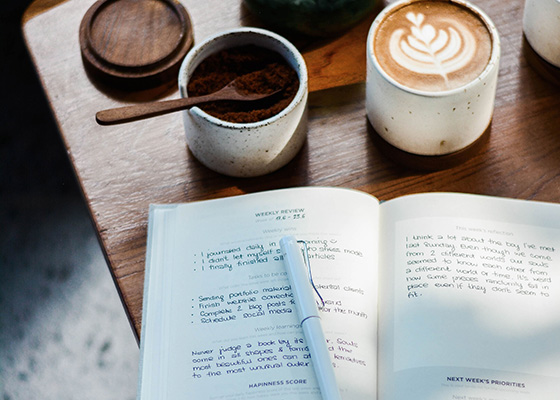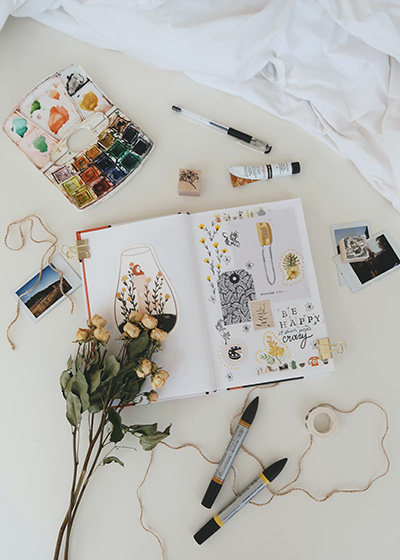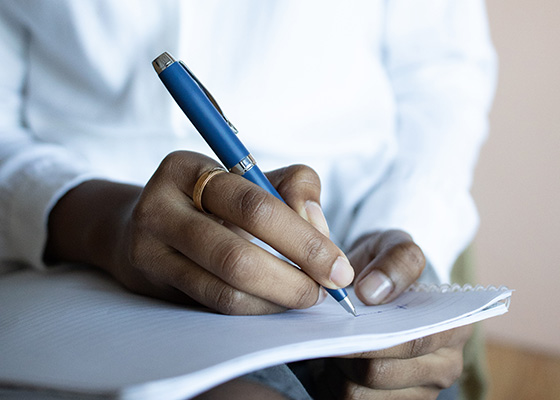Journaling For Beginners
Step away from fast fashion with these expert tips to buying less but buying better. We speak to three personal stylists on how know your style, declutter your wardrobe and shop more consciously.
What are your immediate thoughts when someone mentions journaling? It’s likely going to be a painful flashback to those teenage years, as journaling has been a shelter for many at this time in their lives. Keeping a journal can act as a private space to confess struggles and fears. However once you embark on adulthood, you probably stopped writing in your diary with as much commitment. Journaling is becoming the latest trend in wellness and we’re investigating what all the fuss is about.

What is Journaling?
The overall methodology and its benefits still apply. By writing down your emotions, feelings, and thoughts, you can begin to gain clarity and distance from what troubles you. Journaling is incredibly advantageous if you struggle with stress or anxiety. If you simply want to take care of yourself and level up a certain area of your life, whether it be love, your professional path, creativity, or your well-being, keeping a journal can help here too.
Journaling is something that anyone can enjoy. Keeping a diary is a form of self-reflection that isn’t intimidating or too demanding. According to novelist Grothaus, journaling “requires the application of the analytical, rational left side of the brain. While your left hemisphere is occupied, your right hemisphere (the creative, touchy-feely side) is given the freedom to wander and play”. This combination of creativity and rationality make journaling perfect for balancing overwhelming emotions with a clear mind.
Do you work in sustainability?
The WIP is our new digital platform for eco aware brand founders, entrepreneurs and side hustlers. It's a place to find community as well as learning resources. Launching this Winter, you can sign up for updates below.
Why Should You Journal?
Journaling can help you manage anxiety, reduce stress, cope with overwhelming emotions, boost your clarity and productivity, as it helps control your symptoms and improve your mood. But how? Simply by analysing your fears and helping you prioritise problems and concerns, you can track any symptoms day-to-day, helping you to recognise triggers and learn ways to better control them.
Think of it as constructive self-talk, where you can identify negative thoughts and behaviours. You can also figure out which strategies to implement on a daily basis to help you combat them. The magic of journaling is that often the smallest changes are the most revolutionary ones. A simple practice, done frequently and regularly can make drastic changes gradually and gently, especially for those struggling with making a drastic decision for example.

According to psychologist Barbara Markway, “there’s no better way to learn about your thought processes than to write them down”. To address our problematic thought patterns, we first have to actually identify and locate them. Journaling is instrumental in helping us identify our negative automatic self-talk and get to the root of our anxiety. But it’s not just about healing what’s hurting. It can be great to focus on what needs extra attention, and to boost productivity and gratitude. By naming the blessings that are part of your life, you’ll be able to cultivate gratitude, an effective tool for reaching your personal goals and improving your quality of life.

How to journal
Journaling can also be a check-in tool. For example, there are seasons in our lives when we feel extra stressed or overwhelmed, and we can’t locate which feelings are taking over or how to tackle them. That’s when journaling can make an impressive improvement. However the value of journaling comes through when we do it consistently.
Keep in mind these tips when you get started;
- Treat yourself to a beautiful notebook or journal to inspire you to get started. We love Papier’s upcycled leather notebooks.
- Make it a daily habit. Help to keep this a regular habit by choosing a time of the day you know will be clear. You can also choose a cosy spot in your home where you know you won’t be disturbed.
- Don’t beat yourself up if you don’t have the energy for it for a while. What’s important is to go back to it whenever possible.
- Keep it simple. After all, you just need a pen and paper! Unless you’re a tech lover, but journaling should also be treated as a break from devices that normally distract or stress you out. Carry your journal with you, and you can make the best out of your commute.
- Feel free. Remember your journal is your safe space, and therefore allow yourself to let go and embrace the chaos that sometimes resides in your mind. Just write down whatever feels right. Your journal doesn’t need to follow any certain structure, but you can choose certain directions. As an example, you can try to answer certain questions to yourself. Such as: What scares you? How do you cope with worry? Dear Past Me…/ Dear Future Me…
- Don’t limit yourself to simply writing. You can draw, collect pictures or memories you want to reflect on, or you think they will be relevant in your future.
- Look at your writing time as self care and relaxation. It’s a time when you can wind down: look forward to your journaling time, remember that you’re doing something great for yourself rather than another commitment to stick to.
- Remember to note down 3 things that you are grateful for. This grounding practise reminds us of what we already have in our lives.
Did This Put A Smile On Your Face? Why Not Subscribe?
If you enjoyed this then theres plenty more on our email newsletters that you'll love. Whether you're a sustainable newbie or an eco conscious pro, our bi monthly emails will inspire you to live sustainably and ethically.
Disclaimer: The people and models in the images featured are not associated with The Vendeur and do not endorse it or the products shown. This post may contain affiliate links. Prices correct at time of publishing.





